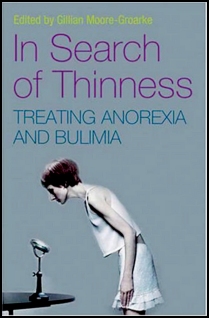Bulimia Nervosa
WHAT IS BULIMIA NERVOSA?
 Bulimia Nervosa is often referred to as the binge-purge syndrome. It generally consists of gross overeating, followed by induced vomiting/laxative abuse/starvation/exercise to rid the body of the food consumed during the binge.
Bulimia Nervosa is often referred to as the binge-purge syndrome. It generally consists of gross overeating, followed by induced vomiting/laxative abuse/starvation/exercise to rid the body of the food consumed during the binge.
HOW DOES BULIMIA NERVOSA AFFECT YOU PHYSICALLY?
It can cause relatively serious physical problems such as damage to the teeth caused by the action of gastric juices on the enamel, loss of hair, throat infections, haemorrhages and damage to vocal cords, disturbance of body electrolyte balance, abnormal potassium levels, depletion in essential nutrients, resulting in faintness and fits. Loss of menstrual cycle or irregular menstrual cycle is common. Unlike the anorectic, the bulimic does not necessarily have abnormally low body weight. She/he can be of normal weight/overweight/underweight.
HOW DOES BULIMA NERVOSA AFFECT YOU PSYCHOLOGICALLY?
Just like the anorectic, the bulimic shares a marked concern with body size, and have a morbid fear of becoming fat. With bulimia it is common to feel disgust, helplessness and panic when the binge is upon one. The purge can be a source of relief for many. What starts off as a once-off binge/purge very quickly leads to an addictive behaviour pattern of binging and vomiting. Periods of depression and anxiety are common, not to mention guilt, extreme self-hatred and self-worthlessness, low self-esteem, social isolation and severe mood swings. It is interesting to note that the vast majority of bulimics are women, the most common being in adolescence or young women. Often people with bulimia tend to portray a competent, confident image to the world. The bulimia is often a deeply hidden secret.
HOW DOES BULIMA NERVOSA AFFECT YOU SOCIALLY?
It is an expensive habit, as much as €60.00 worth of food can be eaten at one binge. If binges are frequent – imagine the bill! This in turn leads to lying and cheating of justify the money spent. Sometimes it leads to stealing to cover expenses. Bulimics suffer isolation from family and friends. A social life can be non-existent, due to:
- Disgust of oneself after a binge, feeling bloated, depressed, guilty, inadequate, and insecure.
- Financial debt due to money being spent on food/laxatives/diuretics.
- Not being understood by others.
Can you identify what I am saying to you?
A BULIMIC’S PERSONAL EXPERIENCE
“I felt such a hypocrite. To the world I was a successful and outgoing girl. People were amazed at my will power and ability to eat sensibly. They never noticed my relatively long lapses in eating patterns. I somehow management to disguise.
“Inside I felt rotten to the core. It was almost like I was leading two different lives – one for the world at large and the other the hidden one ‘My World of Food@. As long as I looked OK to the world then it didn’t matter so much. I know now that feeling had been with me years before even the bulimia ever started. But as my bulimia progressed I became more miserable and more filled with self-hatred desperation and terrible guilt. I had to admit to myself I had a problem. It was not easy. After all, I had portrayed such a perfect image.
“I then went for help. Well, it is still early days yet, but I don’t feel quite so terrible. I realise nobody is perfect, and I shouldn’t try to be. I don’t binge or vomit any more. I am learning why I ended up with bulimia, and just as important I am learning to love myself. I know I would not be where I am today if I did not see help”.
Susan, like so many bulimics, left it for many years before seeking help. First she denied having a problem, then having accepted it she had to acknowledge she need help.
TREATMENT OF BULIMIA NERVOSA
Left untreated, bulimia nervosa is unlikely to go away. Early diagnosis is extremely important. Help is available. There are clinics and centres all over the country, which can help. First the bulimic must identify that they have a problem with food, learn to accept it and then seek Help. The binge/vomiting syndrome has to be stopped, and a healthy attitude towards food encouraged at the same time. Psychotherapy is important, to build up one’s self-esteem and help identify and express one’s feelings.
Much has still to be learned about bulimia nervosa. However, treatment is available and the longer it is left untreated the harder it is to treat successfully.
